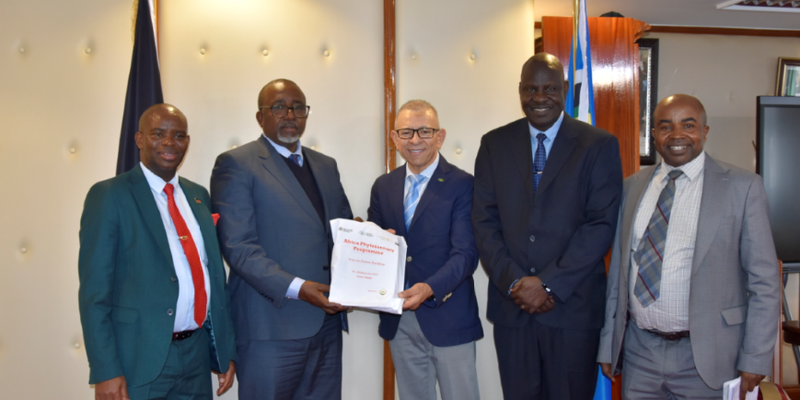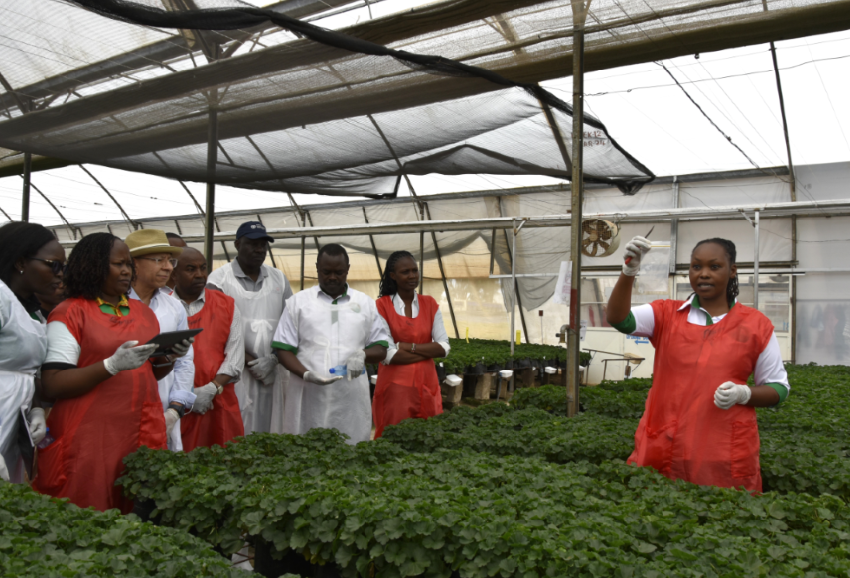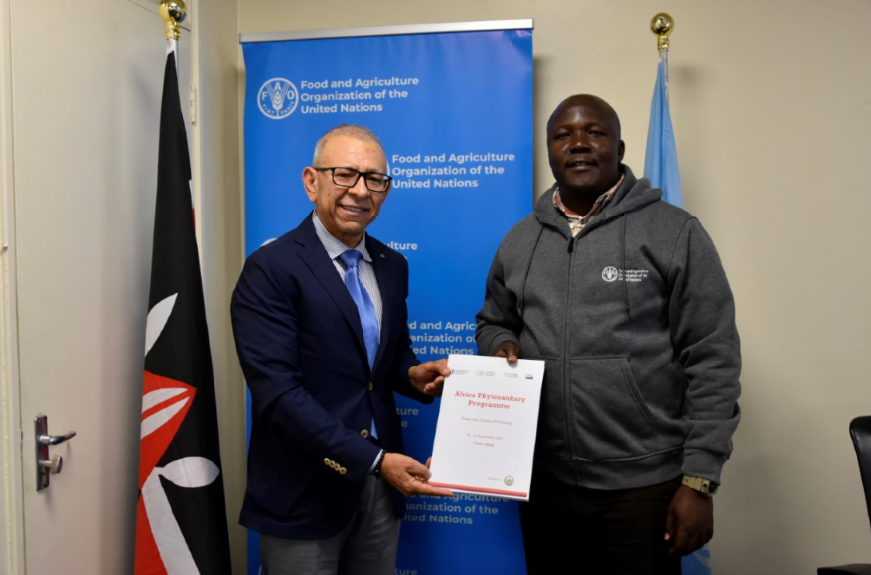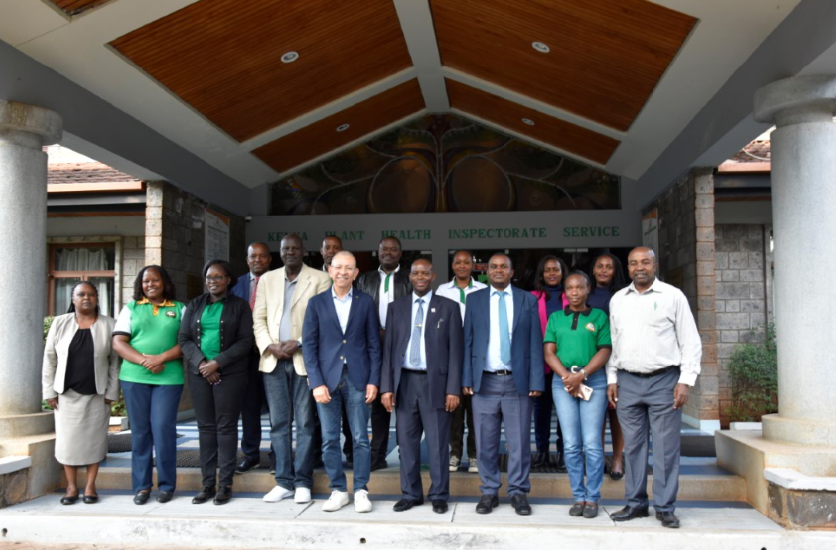Kenya and the Africa Phytosanitary Programme: Advancing plant health and sustaining safe trade
Posted on Fri, 19 Jul 2024, 12:36

(L-R) Theophilus Mutui, Managing Director of KEPHIS, Mithika Linturi, Cabinet Secretary in the Ministry of Agriculture and Livestock of Kenya, Osama El-Lissy, IPPC Secretary, Arop Deng, Integration and Support Team Leader at the IPPC Secretariat and
Nairobi, 10 July 2024. As part of its steadfast efforts to foster plant health and sustainable, safe international trade in plants and plant products, Kenya, through its Ministry of Agriculture and Livestock and the Kenya Plant Health Inspectorate Service (KEPHIS) is implementing the Africa Phytosanitary Programme (APP). APP is an initiative of the International Plant Protection Convention (IPPC) that targets transforming pest management by empowering plant health officers to use science and modern technology for pest surveillance, detection, control and prevention.
Honourable Mithika Linturi, Cabinet Secretary in the Ministry of Agriculture and Livestock, commended the IPPC for championing the global effort to protect agriculture from plant pests and facilitating pest-free trade and economic growth, especially in Africa. He thanked the IPPC for initiating APP and pledged the Ministry’s support to KEPHIS, Kenya’s national plant protection organization (NPPO), which is leading APP implementation in the country.
Linturi was speaking during a meeting with Osama El-Lissy, IPPC Secretary and officials from KEPHIS, the Ministry of Agriculture and Livestock Development, the Food and Agriculture Organization of the United Nations (FAO) and the IPPC Secretariat. The meeting was part of El-Lissy’s working visits to APP-implementing countries.
“I assure the IPPC team of my commitment and leadership of the ministry in providing the necessary infrastructure and technical support to achieve a pest-free Kenya”, he said. He invited KEPHIS to work closely with the Ministry’s Crop Protection Department in implementing APP, ensuring that Kenya continues to produce safe food for both domestic consumption and export. He also thanked the IPPC for promoting the use of technology for pest prevention and prioritising “capacity building of our people”.
Kenya is one of the 11 countries in the pilot phase of APP, which is envisioned to support all 54 African countries in the coming years, to strengthen technical skills of phytosanitary inspectors and other frontline plant health officers in surveillance, detection, control and prevention of pests of concern to agriculture and international trade in plants and plant products.
El-Lissy commended Kenya’s Ministry of Agriculture and Livestock, through KEPHIS, for being a leader in plant health in the region and making significant contributions to advancing plant health in Africa.
“APP is a game changer in the way countries manage pests and protect crop resources because the programme provides the most current science, training and equipment such as computer tablets fitted with advanced pest monitoring, detection and reporting tools,” El-Lissy said.
“APP will enable countries to deliver tangible results by collecting data on the status of the pest presence and using it to provide evidence of pest-free areas for safe export of plants and plant products,” he added.
Kenya’s dedication to a strong plant health system
 |  |
| A KEPHIS plant health inspector demonstrates sample collection as part of surveillance for Xylella fastidiosa using APP applications. | Osama El-Lissy (left), IPPC Secretary presents an information packet on APP to Hamisi Williams (right), Assistant Representative (Programme) at FAO Kenya |
Following the meeting with the Cabinet Secretary, El-Lissy and the technical team at KEPHIS discussed APP implementation and other plant health developments, including the launch of Kenya’s National Phytosanitary Policy. KEPHIS is already using the APP tools to conduct surveillance for pests and pathogens such as Banana Bunchy Top Virus (BBTV), a major threat to banana production in Kenya. As part of its APP operational plan, KEPHIS plans to train more plant health inspectors at major border points and production areas, to use the tools; determine the status of prioritized pests and develop response plans for Xylella fastidiosa, Banana Fusarium wilt and BBTV.
The meeting at KEPHIS also discussed the importance of strategic communication, advocacy and awareness raising about plant health and the importance of plant protection for food security and economic growth.
Kenya strongly contributes to regional and global plant health efforts. Through KEPHIS, Kenya is also involved in and has representatives in various IPPC expert working groups and subsidiary governing bodies such as the Standards Committee, the Implementation and Capacity Development Committee, the ePhyto Steering Group, the Technical Working Group on glossary of terms, Sea Container Task Force, Task Force on Topics and the Focus Group on food and humanitarian aid.
In May this year, KEPHIS hosted the first Fusarium TR4 simulation exercise for the COMESA region. Kenya has also conducted three Phytosanitary Capacity Evaluations (PCEs) to identify and fix gaps in its phytosanitary system.
“KEPHIS is committed to implementing APP and we are optimistic that the programme will strengthen the skills of our phytosanitary officers to protect agriculture and trade,” said Theophilus Mutui, the KEPHIS Managing Director.
FAO support for APP
Hamisi Williams, Assistant Representative (Programme) at FAO Kenya, commended APP as a "noble cause". He pledged FAO Kenya's support to APP's successful implementation and sustainability, including dedicating a technical officer as an APP focal person and facilitating logistical operations such as receipt and distribution of computer tablets and field supplies to KEPHIS.
Williams also noted that FAO Kenya would follow up with the Ministry of Agriculture and Livestock Development, relevant departments and KEPHIS, to discuss harmonizing actions in implementing APP and providing the necessary support.
He pointed out the need to consider climate change mitigation during pest surveillance, to provide early warning on pest infestations. To APP's credit, the programme provides a wide range of filters and applications that enable analysis of pest status data relative to climate change.
The IPPC Secretariat implements APP in collaboration with FAO and the African Union Department of Agriculture, with financial and technical support from the United States Department of Agriculture Animal and Plant Health Inspection Service (USDA APHIS).

The IPPC Secretariat delegation poses with staff of KEPHIS and FAO Kenya

